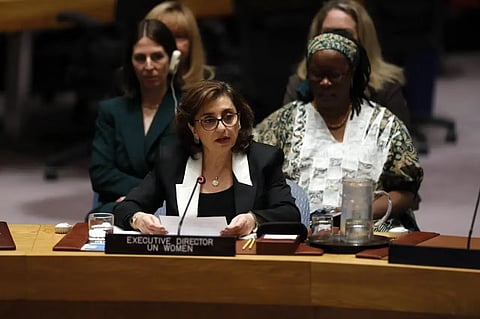

UN Women’s Executive Director Sima Bahous addressed the UN Security Council ahead of the 25th anniversary of Resolution 1325.
She warned of “rising military spending” and a global backlash against gender equality.
676 million women and girls now live within reach of deadly conflict, the highest figure since the 1990s.
Bahous urged states to invest in women-led peacebuilding and hold themselves accountable for results.
“Those who oppose equality do not own the future, we do,” she said.
At the United Nations headquarters in New York on October 6, 2025, UN Women Executive Director Sima Bahous urged member states to turn the 25th anniversary of Security Council Resolution 1325 on Women, Peace and Security into a turning point rather than a commemoration.
Speaking before the Security Council, Bahous warned that the world was witnessing “rising military spending and renewed pushback against gender equality and multilateralism”, undermining the foundations of peace and security.
“Today, 676 million women and girls live within reach of deadly conflict, the highest [number] since the 1990s,” she said. “Women and girls who live amidst conflict deserve more than commemoration. It must instead be a moment to refocus, recommit, and ensure that the next 25 years deliver much more than the last.”
The unanimous adoption by the United Nations Security Council of Resolution 1325 recognises the specific impact of conflicts on women and acknowledges women’s essential role in maintaining and promoting peace and security, preventing and resolving conflicts.
Resolution 1325, adopted in October 2000, recognised the crucial role of women in conflict prevention, peace negotiations and post-conflict reconstruction. But Bahous said progress since then has been uneven, marked by “bold commitments followed too often by weak implementation and chronic under-investment.”
Referring to ongoing wars and crises, she cited the plight of women in Gaza, Afghanistan, Sudan, and Haiti. Bahous welcomed what she described as “positive responses” to United States President Donald Trump’s proposal for a ceasefire in Gaza and called for “a just and lasting peace for Palestinians and Israelis alike, where all women and girls live with dignity, security and opportunity.”
She pointed to stark global trends that are worsening conditions for women and girls: shrinking education opportunities, collapsing health systems, and reduced humanitarian funding. “Short-sighted funding cuts,” she said, are already depriving Afghan girls of schooling and limiting life-saving care for survivors of sexual violence in Sudan, Mali, Somalia, Haiti and elsewhere.
Despite deepening crises, Bahous highlighted examples of women leading peacebuilding efforts around the world. Under women’s leadership local conflicts in Abyei and the Central African Republic are being mediated, political representation in Haiti, Chad and Syria are being advanced and gender-responsive budgeting is taking place in Ukraine.
She stressed the need for “significant investment” in women-led organisations on the frontlines of conflict, arguing that years of focus on global security institutions had not been matched by support for grassroots women’s movements.
Bahous also warned of the “normalisation of misogyny currently poisoning our politics and fuelling conflict”, but insisted it could be reversed. “Those who oppose equality do not own the future,we do,” she said.
In the coming years, she added, the women, peace and security agenda must expand to address emerging threats such as online gender-based violence, and include clear accountability measures for states and institutions that fail to act.
She outlined five calls to action:
Ensure affirmative action for women’s participation in peace processes and leadership roles;
Measure progress by women’s direct involvement in peace and security decisions and their access to justice and reparations;
End all forms of violence against women and girls, including technology-facilitated abuse;
End impunity for crimes against women and uphold international law;
Embed the women, peace and security agenda among young people to sustain it for the future.
Closing her remarks, Bahous reminded the Council that Resolution 1325 was a landmark promise but remains only partially fulfilled. “When women lead, peace follows,” she said. “We made a promise to them 25 years ago. It is past time to deliver.”